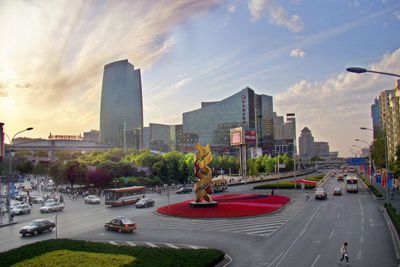Apple has set up its first research and development center in China in Zhongguancun Science Park, according to a statement released by the Zhongguancun Park Management Committee (via DigiTimes).
Zhongguancun is a technology hub situated in the Haidian District in northwestern Beijing and is very well known in China. Often referred to as "China's Silicon Valley", the area has gathered nearly 20,000 technology enterprises since its emergence in the 1950s. The hub has many local prestigious academy affiliations, and is home to research centers for several global tech companies, including Google, Intel, AMD, Sony, and Microsoft.

Apple's new R&D center in Zhongguancun has reportedly registered a capital of $15 million, with total investment likely to reach $45 million in the future, according to the park's press release. The center will employ a total of 500 staff and focus on the development of "computer software and hardware products, communication, audio and video devices, as well as advanced technologies for consumer electronics products and the information industry".
The R&D facility is expected to complete in 2016 and to be used to integrate Apple's engineering and business teams to increase regional sales and services, according to media reports in China.
The news comes on the heels of Apple CEO Tim Cook's announcement last month during a visit to China that an R&D center would be coming to the country "by the end of the year".
The move has been seen as a response to the iPhone's dwindling returns in the country as consumers opt for low-cost alternatives available on the Chinese market. Apple has also experienced a series of setbacks in the region this year, including the closure of the iTunes and iBooks store and a number of lawsuits that have prevented it from being able to focus on gaining traction in the country's lucrative mobile segment. Although once Apple's second largest market in the world, the company announced during July's earnings report that its revenue in China had dropped 33 percent year-over-year.
Apple has set up similar R&D centers in Japan, Israel, and the UK, and is said to be planning similar facilities in Canada, India, Indonesia and Vietnam to take advantage of local resources.



















Top Rated Comments
[doublepost=1475148707][/doublepost]They did, the customers are, and the dongle was free in the box.
I didn't think I'd see the day Apple needs a multimillion dollar investment to relearn what Steve already knew...stop trying to shake down your customers for profit on a $9 dongle and instead build an insanely great product that truly is the best that you can make with the technology available so that customers will see the value for their hard earned money.
Don't get me wrong, I am not stupid. I understand international business sufficiently to understand and agree that Apple needs to establish substantial presence in the countries to which it sells its products. I'm just saying there is a reason that's not hard to figure out about its declining sales in China.
I don't hate Apple, goodness no or I wouldn't be here and I wouldn't be planning out future purchases from them. I'm just giving them a bit of a o_O look at some of the things I think run contrary to the focus on the customer experience that I was used to getting from them.
[doublepost=1475159637][/doublepost]I would imagine or hope that's all Apple expects to get out of this. Serious R&D will be pilfered so they would be wise to stick to endeavors that will benefit the local population in much the same way they were able to develop the capability for the IPhone to work with the Japanese card system. There are elements to Chinese culture and daily life that should not be left to guessing or assumptions or even visits. Heck, I'm half Asian and I get it wrong a lot when it comes to understanding the nuances of the various Asian cultures that make up my heritage. It is really challenging to mix perspectives from east and west and not screw something up. Apple needs to be there in the thick of this daily life to better serve their Chinese customers.
I just wonder if the Chinese government will foil them at every turn there.
I do question how Tim justifies to himself as a human being all the butt kissing he has to do in order to conduct business in a country that has so many government sanctioned restrictions on gay rights as well as other human rights violations like enforced abortions listed in the other post on this thread.
Apple is gearing up for (further) domination.
In light of that gruesome statistic, it is rather incredible India has managed to have a female Prime Minister while the more progressive US has yet to elect a female president. It has always fascinated me to look around and see the numbers and influence of female leaders who manage to rise to prominence in some of the countries that are more restrictive if not downright brutal to women.
I think the difference between China and India is that officials in India are working toward change. Clearly that female Minister is attempting to make things better for females. They are trying to eradicate brutality in India and it really persists on an institutional level due to corruption, not ideology. But in China, the brutality and oppression is instigated by the government itself. So I can see less ethical conflict about Apple moving into India to do business, but in the case of China which practically celebrates its oppression of people and in fact holds it up as an example to be exported, Apple has to concede a vast disconnect between Tim's stated commitment to social responsibility for Apple.
[doublepost=1475245346][/doublepost]Like I said it's not about this one "dongle" per se, but about what it represents in terms of Apple making changes not for consumer benefit but to eke out more profit. There are numerous comments from forum members, tech reviewers and pundits in general about the logistical pain in the tail this move by Apple has engendered and their possible profit motive for initiating it.